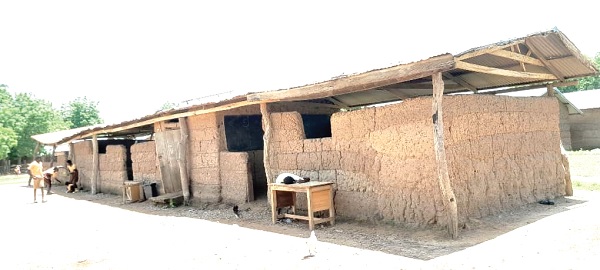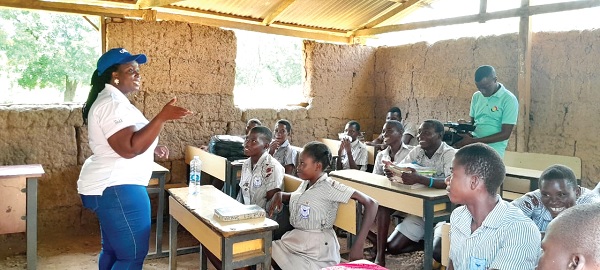While almost all urban towns and communities have basic schools, some island communities in the Krachi West District in the Oti Region cannot boast of a single structure as a school building.
The district has 48 island communities, out of which only 21 have schools.
Three out of these 21 are basic schools which start from kindergarten to junior high school while 18 start from the kindergarten to primary.
There are a total of 3,355 students receiving education in these 21 island communities. Out of the total, 1,597 are females and 1,758 are males.
The remaining 27 island communities with no schools are: Kwatakwata, Yaben, Kotokoli, Adasi, Katekope, Old Otisu, Kpordoave, Tekporkope, Agudeykope, Edeykope, Old Makokoaye, Yayokope, Israel, Obimpeh, Canaan, Anlokope, Ageykope, Jericho, Ayawkope, Banka, Goldsmith, Mauritania, Akoebai, Mataheko, Fantekope, Kwasiadai and Volivo.
Fortunately for the 15 island communities in the adjoining Krachi East District, however, almost all have basic schools the children of school-age attend.
There are a total of 1,957 students who benefit from education in all 15 island communities in the Krachi East Municipality comprising 1,072 males and 885 females.
However, in view of the lack of schools in the 27 island communities in the Krachi West District, some schoolchildren and teachers from these islands with no schools travel by boat to the closest island community either in Krachi East District or Krachi West Municipality to access education.
Schoolchildren in schools with no junior high also have to cross the river to other nearby island communities with schools to pursue junior high education.
One of such schools attended by children from other communities is the Kudorkope M/A Basic School.
During a visit to the Kudorkope island community in the Krachi East District from the Oti Regional capital, Dambai, it was noted that a journey from one island community to the other covering about 10 kilometres took one hour and 10 minutes on the average.

The lower primary school structure at Kudorkope
The journey, however, from one island community in the Krachi West District which is about 60 kilometres, takes three to four hours on water.
Moreover, during the rainy season, the river overflows its banks and claims many lives.
Journey to island
Frozen with fear, although all 25 occupants of the canoe fitted with an outboard motor were strapped in life jackets, it took us one hour crossing River Oti to the Kudorkope M/A Basic School and back from Dambai.
The team from the Ghana National Association of Teachers (GNAT) included officials from the Volta Region GNAT and Krachi East district office, and we were on the trip to make a presentation of life saving jackets to pupils and staff of some schools in the area including Kudorkope M/A.

The junior high school structure
According to authorities, a journey from one island community to the other took three to five hours, while the journey from Dambai was the shortest.
Kudorkope, one of the vulnerable and deprived island communities in the Krachi East District with a population of over 1,800, has fishing as its major occupation.
Teachers are compelled to cross the river from Dambai to the Krachi West Municipality to receive their salaries, buy foodstuffs on market days and sometimes attend meetings and trainings. Schoolchildren on the other hand cross the river for long hours to school and back every day.
At the Kudorkope M/A Basic School under the Krachi East Municipal Assembly, the mud structure with wooden supports being used as classrooms stared in our faces, with its rickety roofing sheets and adjusted blackboard used to teach the pupils.
There was despair on the faces of members of the team when it visited the classrooms of the lower and upper primary, only to see used car seats’ serving as school desks and chairs for the schoolchildren to sit on to learn.

Egbetorhia Vasty Nunana (left), National Executive Member of GNAT, advising the junior high school students
Some wooden desks in the classroom were also damaged to the core, with nails dangerously jutting out of some, which most often hurt the students.
The Sustainable Development Goal One (SDG 1) pushes for the commitment to eradicate poverty in all its forms, end discrimination and exclusion, and reduce the inequalities and vulnerabilities that leave people behind and undermine the potential of individuals and of humanity as a whole; but the people living on island communities seem to have been neglected and abandoned.
Speaking in an interview, a primary six pupil, Pafioy Djangmah Mawuli, who dreams of becoming a teacher, said he had never seen a computer and did not even know what it was.
One would have thought that a deprived school such as Kudorkope M/A, with no computer lab and no important facilities to augment its teaching and learning, did not have a pupil who could speak good English; but Pafioy Mawuli was exceptional.
He expressed himself excellently; and there are similar students in the school with big dreams and aspirations.
Despite the challenges he faces as a pupil, Mawuli hopes that the government through the Ghana Education Service would turn attention to the school and offer assistance.
Donation

Rev. Isaac Owusu handing over the life jackets to the school. Looking on are Alhaji Kassim Seidu Baba, the Regional General Secretary for GNAT, some students and teachers
The leadership of GNAT, led by the National President, Rev. Isaac Owusu; the General Secretary, Thomas Tanko Musah; Trustees, Regional and District Executives and some teachers, last week Friday, donated 251 life jackets to schools in some island communities in the Oti Region.
The exercise which is taking place nationwide would target teachers posted to teach in deprived communities and in the hard-to-reach areas.
The aim is to provide safety and a good working environment for teachers posted to work in such areas, as well as to encourage them.
The donation had become necessary after the loss of a teacher, Sampson Adu, who was a teacher at Odomankoma M/A Primary in Krachi West, who drowned when crossing the river during a rainstorm to receive his salary and buy foodstuffs.
The boat capsized and unfortunately, he could not be found until a search was conducted and his body was found on the third day of the search.
The General Secretary of GNAT, Mr Musah, said the aim of the association was to ensure equitable quality education.
He cautioned teachers to take their safety seriously and called on government to, as a matter of urgency, invest in the well-being of teachers.
“The spotlight must be put on working conditions of teachers and improvement in the quality of education.
Education is a right and the state cannot fail these teachers.
There should be no loss of lives in the course of leaving no one behind.
The Ghana Education Service, who is our employer should put strict measures in place to save the lives of teachers,” he stated.
Call
The Krachi West District Chairman, Osei Bonsu, who spoke to the Daily Graphic, bemoaned that no orientation and training was given to newly posted teachers, while overloading and inexperience on the part of the boat riders were the causes of loss of lives on the river.
He also bewailed that the stumps raised in the Oti River to serve as a cover for people when a boat capsized, had been uprooted by the Ghana Maritime Authority.
This, he said, was because the stumps were noted to be one of the causes of boat accidents.
He placed a clarion call on government to make arrangements to provide training and working gear to teachers to ease their burden in their field of work.
“Teachers and children are in danger.
The teacher does not have working gear to use, where a teacher sleeps is a challenge.
They risk their lives and work under harsh conditions.
Teachers posted to island communities and hinterlands must be trained and oriented,” he reiterated.
Reward for dedication
In his address, the Chief of Kudorkope, Torgbe Kudor Walahi III, lamented that schoolchildren were forced to study under ‘sorry state’ structures used as classrooms.
He said teachers in the community deserved to be rewarded for their dedication to work despite the challenges they faced on the islands.
He noted that in their efforts as a community to enhance education, they had mobilised resources and manpower to put up some mud bungalows to house the teachers in Kudorkope.
He appealed to the GNAT leadership and the government to assist with roofing sheets to complete the structures that had been put up to serve as temporary accommodation for teachers.
This, he said, would ease the burden of travelling on the river to and from work.
The Headmaster of the school, Gustav Apati, expressed gratitude to the GNAT leadership for the donation, and appealed for the government’s intervention in rescuing school children and saving the lives of teachers who travel daily on water to teach because there is no accommodation for them.
He also re-echoed the call to the GES to consider giving a one-month orientation to teachers posted to the hinterlands.



